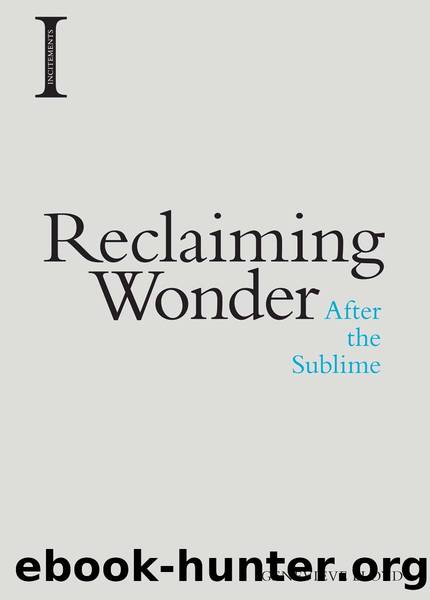Reclaiming Wonder by Genevieve Lloyd

Author:Genevieve Lloyd
Language: eng
Format: epub
Publisher: Edinburgh University Press
6
Reconnecting with Socratic Wonder: Heidegger and Arendt
We may no longer think of ourselves as sublime. Yet we can still respond to the emotional power of the concept, even if we cannot see it as central to our understanding of who we are. The sublime still resonates in our responses to scenes of wildness and grandeur, and it still epitomises awe and admiration in the evaluation of art and literature. But the continued intelligibility and appeal of the sublime as an aesthetic notion does not minimise the sense of loss of connection, in relation to older ways of thinking of – and with – wonder. More recent philosophy has seen some significant efforts to reconnect with some of that lost centrality of wonder to thinking.
As the old connections between wonder and intellectual inquiry became attenuated, a long-standing ambivalence was able to harden into more explicit mistrust or disdain. With wonder absorbed into the sublime – now the domain of art or poetry – philosophical concern with wonder could be relegated to aesthetic theory. Kant’s emphasis on the unity of the mind’s faculties had brought aesthetic judgement into relation with theoretical and practical reason, as well as with imagination. The weakening of that sense of a harmonising between mental faculties left the sense of the sublime disconnected from other aspects of the life of the mind. With wonder no longer regarded as central to inquiry, its connections with imagination could more readily come to be seen as primarily concerned with the construction of fictions. Wonder then comes to belong with the creation of fictional objects, rather than with the understanding of what is objectively there. It becomes a stimulus to the generation of fantasies, while remaining nonetheless a powerful emotional response to Nature.
Wonder has been conceded a place in contemporary consciousness: there is, after all, a thriving market for fantasy literature. Yet, having come adrift from its old connections with intellectual inquiry, it has also largely lost its place in the understanding of reality. In the early twentieth century, Martin Heidegger attempted to restore to wonder something of its old status by reconnecting it with its Socratic past.
Heidegger on Wonder at the Ordinary
Heidegger made only passing reference to wonder in elaborating his central concept of Dasein, in his best-known work Being and Time, published in 1927. It has, however, an important place in the related account of attunement, which he offered in the sections on ‘World’, ‘Finitude’ and ‘Solitude’ in his 1929–30 lecture course, published in 1983 as The Fundamental Concepts of Metaphysics. He later spelled out the ramifications of those reflections in a more direct discussion of wonder in his later lecture course of 1937–8, published in 1984 as Basic Questions of Philosophy.
In his treatment of wonder, Heidegger is concerned to rethink the nature of the intellectual activity involved in philosophical thought. That activity, he argues, happens in a fundamental attunement – a distinctive ‘disposition’ which sets philosophy apart from scientific inquiry. The term is intended to give content to an
Download
This site does not store any files on its server. We only index and link to content provided by other sites. Please contact the content providers to delete copyright contents if any and email us, we'll remove relevant links or contents immediately.
The Secret History by Donna Tartt(19010)
The Social Justice Warrior Handbook by Lisa De Pasquale(12179)
Thirteen Reasons Why by Jay Asher(8878)
This Is How You Lose Her by Junot Diaz(6865)
Weapons of Math Destruction by Cathy O'Neil(6253)
Zero to One by Peter Thiel(5773)
Beartown by Fredrik Backman(5720)
The Myth of the Strong Leader by Archie Brown(5484)
The Fire Next Time by James Baldwin(5418)
How Democracies Die by Steven Levitsky & Daniel Ziblatt(5207)
Promise Me, Dad by Joe Biden(5134)
Stone's Rules by Roger Stone(5070)
A Higher Loyalty: Truth, Lies, and Leadership by James Comey(4942)
100 Deadly Skills by Clint Emerson(4902)
Rise and Kill First by Ronen Bergman(4766)
Secrecy World by Jake Bernstein(4733)
The David Icke Guide to the Global Conspiracy (and how to end it) by David Icke(4690)
The Farm by Tom Rob Smith(4494)
The Doomsday Machine by Daniel Ellsberg(4477)
